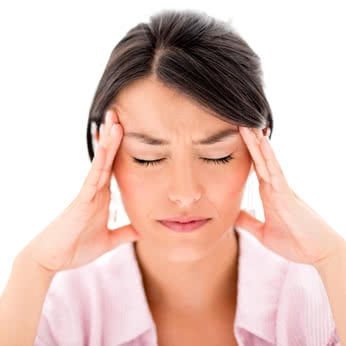Many women sometimes experience sudden unexplainable changes in their moods or take actions or make decisions which they do not desire.

Some women may find themselves laughing one minute and crying the next minute for no apparent reason. For others, there is a feeling of not being in control of their emotions and reactions to circumstances around them, many who have bothered to observe it, this undesirable, seemingly uncontrollable short lived period is commonly noticed days or weeks before the monthly menstrual period and goes away within a few days after the onset of the menstrual period.
Many have often used the phrase “It’s that time of the month” as a way of describing a female’s sudden, unexplained, unusual mood swings, physical or behavioural changes.
Premenstrual syndrome can be described as a series of physical, psychological or behavioural changes that occur in women days to weeks before their menstrual period, usually cyclical and resolve at or within a few days after the onset of menstrual flow.
It is quite common and affects about ninety percent of women, especially those in the child bearing age. It is commoner in women between the ages of 20- 40years with ovulatory cycles, however, some women may experience it even earlier and it resolves at menopause.
In some cases, PMS can lead to behavioural changes that affect the individual’s interpersonal relationships and lifestyle.

There is an extreme form of PMS which is known as Premenstrual Dysphoric Disorder (PMDD) and is considered to be a mental disorder in which affected persons may become severely depressed, anxious or markedly irritable and may require medical treatment for symptoms to resolve.
People with PMDD will experience the symptoms of PMS in an exaggerated way. Premenstrual syndrome affects only females as the name implies.
The exact cause of PMS is not known, however, research has shown that certain associated factors like reduction in the body’s serotonin levels, certain micronutrient deficiencies, hormonal changes( like fluctuating levels of progesterone) amongst others.
Majority of females in their reproductive age are affected by PMS, though the severity and manifestation may vary amongst individuals.
Some risk factors also found to be associated with increased chances of developing PMS are obesity, smoking, high sodium intake, alcohol, caffeine, excess sugar intake, positive family history of depression.
There are many symptoms associated with PMS, some of which include a history of periodic mood swings or behavioural changes that occurs before the onset of the menstrual period and gradually resolves within the first few days of the menstrual period.
Many other symptoms which are usually cyclical include poor sleep, headaches, abdominal bloating, breast tenderness, anxiety, tiredness, backaches, irritability, food cravings, social withdrawal, depression, being angry for no reason, being easily upset, having low self-esteem, weight gain, acne, confusion, delusion, hallucination, body aches/pain and in severe cases there may be panic attacks, crying often, lack of interest in daily activities and relationships, difficulty with focusing, feeling out of control, feeling of sadness or despair amongst other symptoms.

Due to the fact that the symptoms of PMS are not specific to it alone, it is important to remember that other conditions with similar symptoms should be excluded.
The diagnosis of PMS is mainly clinical after the doctor gets a health history from the affected person and thoroughly examines the person to rule out any other medical condition.
Women may assist in diagnosis by keeping a record of their symptoms over a period so that the doctor can assess the pattern of the condition.
Depression is of huge concern it is mostly overlooked by the affected individual and can lead to more serious consequences if not treated early.
Read Also: NIGERIAN YOUTH TAKE OVER FIGTH AGAINST ‘MENSTRUAL PERIOD PORVERTY
The treatment of PMS targets the relief of symptoms. There are different modalities of management of PMS which include medical treatment, behavioural therapy, stress management techniques, psychological counselling.
Medical treatment with drugs like antidepressants, hormonal treatment, multivitamin, food supplements should be done only when indicated and recommended by your Primary Physician. Self-medication using over-the- counter drugs can result in misuse.

Drugs may be required in moderate to severe cases of PMS. Modalities of management will depend on severity of symptoms, how it affects the quality of life of the woman and should be discussed with medical pra ctitioners. Some other measures that may be adopted to relieve PMS (though the list cannot be exhausted) include:-
• Eating a healthy diet. High fibre foods like fruits, vegetables, legumes, whole grains are encouraged over intake of highly refined meals
• Lifestyle modification
• Adequate relaxation and using effective stress management techniques
• Behavioural counselling
•. Spending time on activities the person enjoys can help with coping with some symptoms especially those that affect the mood like anxiety or depression.
• Cutting down on excess sugar and salt intake
• Cessation of cigarette smoking
When PMS affects an adolescent, the effects may not be well tolerated which can lead to serious interruption of daily life, hence education and awareness are very crucial in the management of PMS especially as a result of the fact that the condition is recurrent and may be experienced for a long time.
Identifying the condition will help the individuals respond appropriately and be aware of their emotions at all times to manage it better.

Family and community support is highly essential for people with PMS as it can reduce the number of cases that progress to become severe. Women should be encouraged to deal with the condition in positive and effective ways.
Post Disclaimer
The opinions, beliefs and viewpoints expressed by the author and forum participants on this website do not necessarily reflect the opinions, beliefs and viewpoints of Anaedo Online or official policies of the Anaedo Online.

